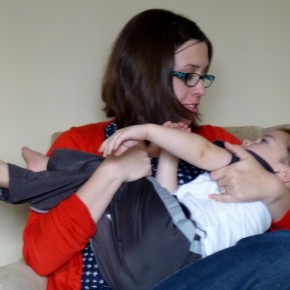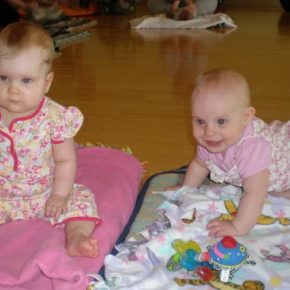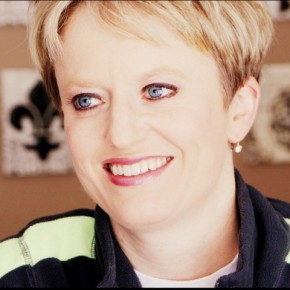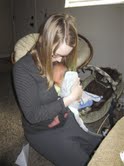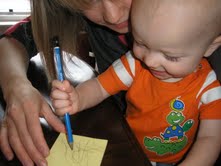Juggling Without a To-Do List: Reflections From a Work At Home Mom
 It’s a realization familiar to any work-at-home mother of small children: that moment in the day when you realize that your kid is not going to nap and you need to readjust your expectations for your day accordingly.
It’s a realization familiar to any work-at-home mother of small children: that moment in the day when you realize that your kid is not going to nap and you need to readjust your expectations for your day accordingly.
It’s become the most dreaded moment in my quest for work/family balance. For me it symbolizes every thing that’s missing from the simplistic “lean in”/”opt out” public conversation about women’s lives.
It’s early afternoon, and I have a checklist of tasks — articles to write, e-mails to send, phone calls to make — that still need to be done. That list, that uncompromising and guilt-inducing list, sits next to me at my dining room table, my work station. Usually my son naps for two hours, but sometimes he won’t nap at all, despite my best efforts. As my son screams from his crib, “Mommy! Mommy!” I scratch off items from my daily list, assigning them reluctantly to tomorrow’s list. My work day is over. Now I’m Mommy, not education writer with a doctorate. Not aspiring freelance writer. Not parenting blogger. Just Mommy. And I feel an uncomfortable mixture of pleasure, gratitude about being able to spend a whole lovely summer afternoon with my son, frustration, and failure.
I’ve had this “daily list” since my boarding school years of high school, pinned to my bulletin board in my dorm room. I was a master at checking off every item each day on the List. I had separate columns for short-term goals (finish French homework) and long-term ones (learn 10 new SAT words). Later, my List would sit at my desk at every job that I had through my twenties and thirties. I never missed a deadline, never missed a meeting, never passed over any professional opportunity offered to me. I just added it to the list. In graduate school, I thrived. I finished my research papers ahead of schedule. I juggled research assistant positions, research fellow opportunities, teaching assistant jobs with my class schedule and other priorities. But I had my trusty List.
When my son was born, I was thrown into uncharted territory. Was I a stay at home mom? How would I ever finish my dissertation? Since I wasn’t making any money, how could I justify child care for the large blocks of time that I needed to analyze my data and write my dissertation?
I had to learn to something new to me, how to seize small moments: a few seconds to jot down ideas in notebooks at the side of my bed while I tried to rock my son to sleep, quiet walks in the fading afternoon light to think about my research conclusions while walking my son to the grocery store in his stroller.
During these two years, I’m not sure if I’ve been “leaning in” — making conscious choices to pursue both professional and personal success — or if I’m beginning the slow process of “opting out.”
Last week writer one of my favorite writers, Galit Breen, wrote a beautiful piece about the “gifts and pressures” of working from home. I can’t get some of her sentences out of my head. In all the talk about “opting back in” for women who gave up their careers, Galit’s words resonate with me more powerfully than any media headlines.
According to Galit,
Being a work at home mom is a beautiful gift, wrapped in a juggling act that can be hard to maintain.
And in the New York Times Magazine piece from Judith Warner, “The Opt-Out Generation Wants Back In,” I could relate to the mothers’ voices, their compromises, and their joys. What is lost in the public conversation (mostly) about these women is that they are not looking to become — and do not regret that they are not — Sheryl Sandberg.
According to Judith Warner,
And not a single woman I spoke with said she wished that she could return to her old, pre-opting-out job — no matter what price she paid for her decision to stop working. What I heard instead were some regrets for what, in an ideal world, might have been — more time with their children combined with some sort of intellectually stimulating, respectably paying, advancement-permitting part-time work — but none for the high-powered professional lives that these women had led.
Working from home, for so many mothers that I know, is this sort of compromise. Yes, there is the awareness that we will not be the next Supreme Court justice or CEO. We will not be running a Fortune 500 company or a large magazine. You can become discouraged by the goals, the accomplishments that will not be within reach. You miss the companionship and professional support of the workplace. And sometimes I do.
Or, as most women do, you can celebrate the uncertainty, the complexity, the juggling and the possibility, while also acknowledging what has been lost.
My to do list will stay on my dining room table. Every day. I will sometimes check off all of the items on that list. But most days I won’t. But these days, these days of missed naps, playground adventures, and the exhilarating newness and possibility of reinventing myself as a writer, will not last forever. My To-Do List will wait.








